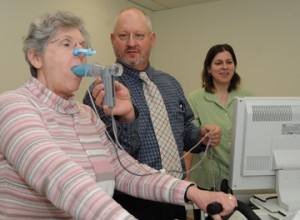By Kevin Gray
Long intrigued by the notion that the mind and body interact in reciprocal ways, Ali Berlin Weinstein ’99 is conducting novel research into the effects of mental stress reactivity on cardiac patients.
Weinstein, deputy director of the Center for the Study of Chronic Illness and Disability, George Mason University, Fairfax, Va., and her collaborators are exploring the impact of cardiac surgery on a patient’s reaction to mental stress. The research is being conducted with Inova Heart and Vascular Institute.

Ali Berlin Weinstein ’99 (far right), and Randall Keyser, associate professor, conduct an exercise test measuring various components of cardiopulmonary fitness, including maximal oxygen consumption, in the Department of Rehabilitation Science, George Mason.
Although a normal response to demanding circumstances, elevated mental stress poses increased risks for some individuals. “Research has shown that some individuals are hyper-reactive to stress, and this hyper-reactivity is a risk factor for various cardiovascular diseases and for mortality from cardiovascular disease,” Weinstein says.
“Although mental stress reactivity has been recognized as a potential risk factor in other heart conditions, it has yet to be investigated in the heart valve and maze surgery populations. Therefore, a good marker for identifying those at risk of future mortality would be useful for clinical care post-valve and post-maze surgery.”
As depression is highly prevalent in heart surgery patients, the research team also is evaluating whether individuals with depression have higher reactivity to mental stress.
As a researcher, Weinstein appreciates the support of her collaborators.
“The science of today is not an individual endeavor,” she says. “You need to be a part of a team. I have been lucky to find strong, encouraging collaborators, and I benefit from their positive mentorship.”
Weinstein, a psychology graduate, first became intrigued by health psychology through a course taught by Alan Childs, professor of psychology and director of the Center for the Integration of Teaching, Learning, and Scholarship. “This class led me to minor in health care and society, which reinforced my love for both psychology and medicine,” she says.
Childs continues to be a model for Weinstein in her role as assistant professor and graduate program director of rehabilitation science at George Mason. “We had many discussions, and I took all of the courses he offered because he is a great teacher,” she says.
Weinstein says Lafayette helped shape the person and academic that she is today.
“I was challenged in my courses to rely on my thought processes rather than simply what is written in textbooks. Being a scientist, these critical thinking skills are essential,” she says.
A resident of Silver Spring, Md., Weinstein holds a master’s in kinesiology from University of Maryland, College Park, and a master’s and doctorate in medical psychology from Uniformed Services University of the Health Sciences, Bethesda, Md.

4 Comments
It is just as important to ensure a patient’s mental well-being as it is to look after their physical condition. Hopefully, studies like this will remind healthcare professionals that they are treating the whole person, rather than viewing them a single diagnosis.
Comments are closed.